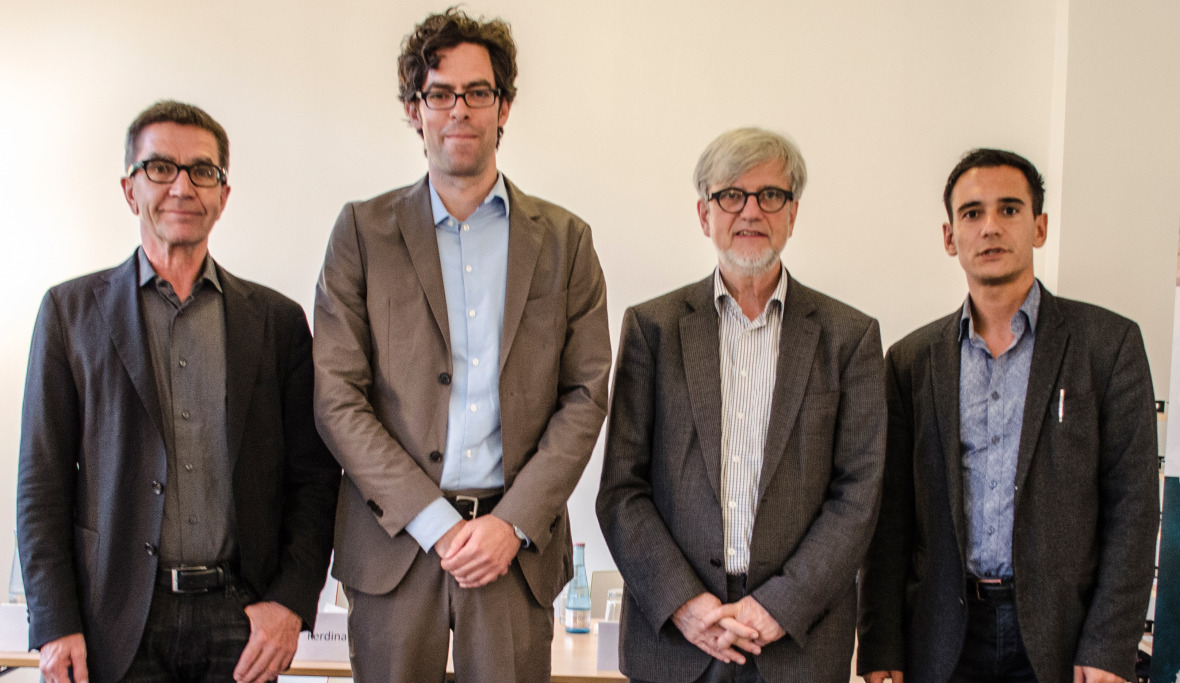An Important Debate or a First World Problem? Journalism and the Growth Paradigm
26.09.2016
Book presentation
It’s difficult to imagine what business journalism would be without the wealth of statistics supplied by economists. Many journalists present Gross Domestic Product (GDP) as a reliable measure of a country’s prosperity. Instead, business journalists should adopt a more critical view of standard economic thinking, argues journalist Ferdinand Knauß (WirtschaftsWoche) in his book “Wachstum über alles? Wie der Journalismus zum Sprachrohr der Ökonomen wurde” (Growth Above All Else. How Journalism Became a Mouthpiece for Economists.) Knauß wrote the book during a fellowship at the IASS. On 21 September, Ferdinand Knauß discussed his views with Rainer Hank, head of the business and finance section of German newspaper Frankfurter Allgemeinen Sonntagszeitung, and IASS scientific director Ortwin Renn.

Journalism as an echo chamber of conventional thinking
Knauß opened the presentation by outlining the origins of the “growth paradigm” in the 1950s and its evolution up to the present day. The idea of growth as a key measure of economic well-being has come under attack repeatedly. Published in 1972, the study “The Limits of Growth” by the Club of Rome was the most influential critique of the growth paradigm. Its effect was not substantial, however, and for decades journalism has served as an echo chamber of conventional thinking, explained the business journalist.
Knauß presents a variety of remedies in his book, ranging from a greater awareness of history to the inclusion of non-expert opinions in journalism, while also noting the need for economists to remember the academic origins of their discipline (Adam Smith, most famously, was a professor of philosophy), which, he claimed, needs to reinvent itself. According to Knauß, newspapers should also take steps to break down the boundaries between their business and feuilleton sections.
Rainer Hank: The growth debate is a “First World problem”
Rainer Hank offered a contrary perspective on both the significance of growth and the role of business journalists. “Until 1820, growth was a privilege known only to the wealthy elites. Since then it has become a measure of progress and of the well-being of society as a whole,” argued the Frankfurt-based journalist. However, the industrialised countries have since become so wealthy that the marginal utility of wealth has declined. According to Hank, this is the basis of current discussions of the drawbacks of growth. The growth debate, he argues, is a First World problem. Questioning claims that the media tends to celebrate growth, he suggested that many journalists are sceptical of the growth paradigm, reflecting a shift in thinking that can be traced back to the oil crises of the early 1970s, which saw prices soar while growth stagnated.
Ortwin Renn praised “Wachstum über alles?” for showing clearly how the growth paradigm has dominated public debate on economic development at the expense of the three other major objectives of macro-economic policy: price stability, full employment, and the achievement of a sound balance of payments. But critics of the growth paradigm should give greater consideration to its deeper implications, said Renn: “By taking Gross Domestic Product as the measure of growth, we are also taking a positive view of activities that harm our economy and diminish overall prosperity through the consumption of resources, through their distributive effects, and through the external costs that they impose on others.” We should, accordingly, seek to develop an index that is more sophisticated than Gross Domestic Product (GDP) and which is capable of reflecting these factors. This could in turn provide the basis for the development of new instruments to steer growth towards sustainable development pathways.
Economic growth – an improper term?
Journalism took a back seat as fundamental issues dominated the open-floor discussion that followed, illustrating the difficulties thrown up by growth paradigm. How useful are sweeping statements on the value (or lack thereof) of economic growth? To what extent is the state capable of steering the course of economic growth? Is civil society able to exercise any influence? Ferdinand Knauß went on to quote German politician Kurt Biedenkopf, who once characterised economic growth as a “perversion of the ecological” because nature maintained a state of equilibrium between growth and decay. “Strictly speaking, ‘economic growth’ is the wrong term. Instead, we should refer to it simply as an increase in GDP,” said Knauß. Abandoning the metaphor of economic growth – a metaphor so common that it is no longer perceived as such – could lend more objectivity to the debate.
Contact
